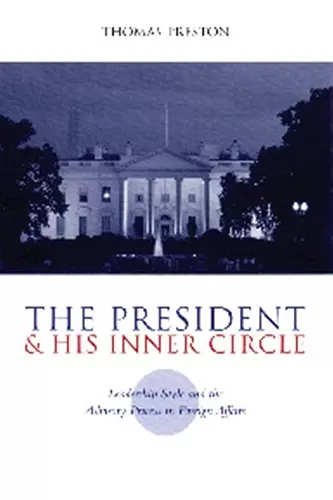The President and His Inner Circle
Leadership Style and the Advisory Process in Foreign Policy Making
Format:Paperback
Publisher:Columbia University Press
Published:5th Mar '01
Currently unavailable, and unfortunately no date known when it will be back

Using M. G. Hermann's Personality Assessment-at-a-Distance (PAD) profiling technique as well as exhaustive archival research and interviews with former advisers, the author develops a leadership style typology. He then compares his model's expectations against the actual policy record, using six foreign policy episodes.
Few would argue that presidential policies and performance would have been the same whether John F. Kennedy or Richard Nixon became president in 1960, or if Jimmy Carter instead of Ronald Reagan had won the White House in 1980. Indeed, in recent elections, the character, prior policy experience, or personalities of candidates have played an increasing role in our assessments of their "fit" for the Oval Office. Further, these same characteristics are often used to explain an administration's success or failure in policy making. Obviously, who the president is-and what he is like-matters. This book, a new approach to the study of the personal presidency, links the characteristics of six modern American presidents-their personalities and their prior policy-making experience-to their leadership styles, advisory arrangements, and decision making in the White House. Thomas Preston uses M. G. Hermann's Personality Assessment-at-a-Distance (PAD) profiling technique, as well as exhaustive archival research and interviews with former advisors, to develop a leadership style typology. He then compares his model's expectations against the actual policy record of six past presidents, using foreign policy episodes: Korea (1950) for Truman, Dien Bien Phu (1954) for Eisenhower, Cuba (1962) for Kennedy, Vietnam (1967-68) for Johnson, the Gulf War (1990-91) for Bush, and North Korea/Haiti/Bosnia (1994-95) for Clinton.
Preston provides an elaborate typology of presidential leadership styles and choices about the organization of policy advice... His labels are carefully developed and defined, and the classification system as a whole is impressive in its complexity and integrative ambition. -- R. A. Strong Choice A thoughtful and incisive work...a workable model for analyzing presidential decisionmaking in both foreign and domestic affairs. -- Michael E. Long White House Studies
ISBN: 9780231116213
Dimensions: unknown
Weight: unknown
256 pages